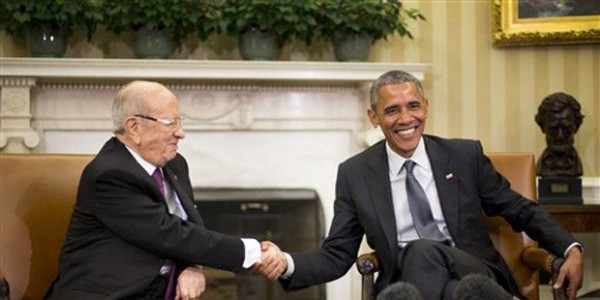
US President Barack Obama announced yesterday his intention to designate Tunisia as a major non-NATO ally, citing democratic reforms in the country.
The upgraded status would put the level of strategic cooperation between Washington and the North African nation on par with US allies like Israel and Japan.
Currently only four other Arab nations have the high-level designation, including Bahrain, Kuwait, Morocco and Jordan.
The announcement followed a meeting between Obama and Tunisian President Caid Essebsi at the White House.
“I want the president and the people of Tunisia to know that the United States believes in Tunisia, is invested in its success, and will work as a steady partner for years to come,” Obama said at a press conference with Essebsi in the Oval Office.
Tunisia was the first Arab nation to be rocked by mass demonstrations in what has become known as the Arab Spring, and is widely regarded as the sole country to have seen lasting reform from the popular uprisings.
Long-time dictator Zine El-Abidine Ben Ali was toppled after 23 years in power in 2011, setting in motion political and democratic overhauls in the country of nearly 11 million people.
Highlighting the importance of Tunisia, Obama said: “The place where the Arab Spring began is a place where we have seen the most extraordinary progress in allowing all parties and all parts of the population, including women and minorities, [to] participate fully in the civic and political life of the nation.”
Obama said he and Essebsi discussed security, counter terrorism, and efforts to stabilise Libya, which has been the site of widespread instability following the death of long-time dictator Muammar Gaddafi.
Extremist groups, including ISIS and Al-Qaeda-linked militants, have exploited Libya’s chaos and established footholds there as the country’s warring factions vie for control.
The situation has prompted security concerns for Libya’s neighbors, including the leaders of Tunisia’s nascent democracy.
“The democratic process is always fragile and threatened by chaos, by parties that do not believe in democracy, that do not follow democratic policies and discourse, but also by our regional environment, which could represent a threat to the democratic process,” Essebsi said.
The White House said if needed, the US would supply Tunisia with a loan guarantee up to $500 million.
“As Tunisia continues to embark on important structural reforms to the economy that we will not only provide short-term aid, but also try to provide the kind of bridge and support that’s necessary to complete those reforms and make sure that they’re effective and benefiting the people of Tunisia,” Obama said.

Leave a Reply
You must be logged in to post a comment.